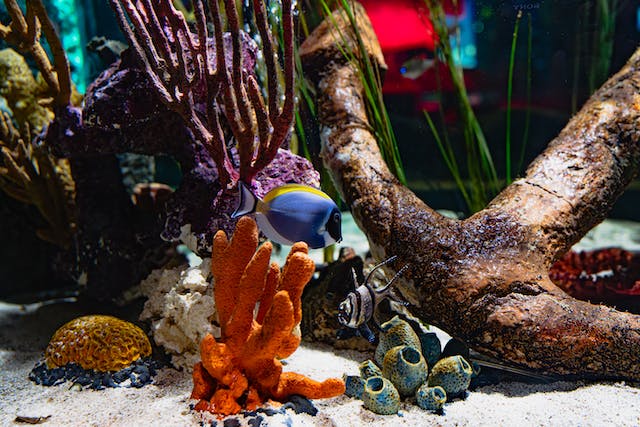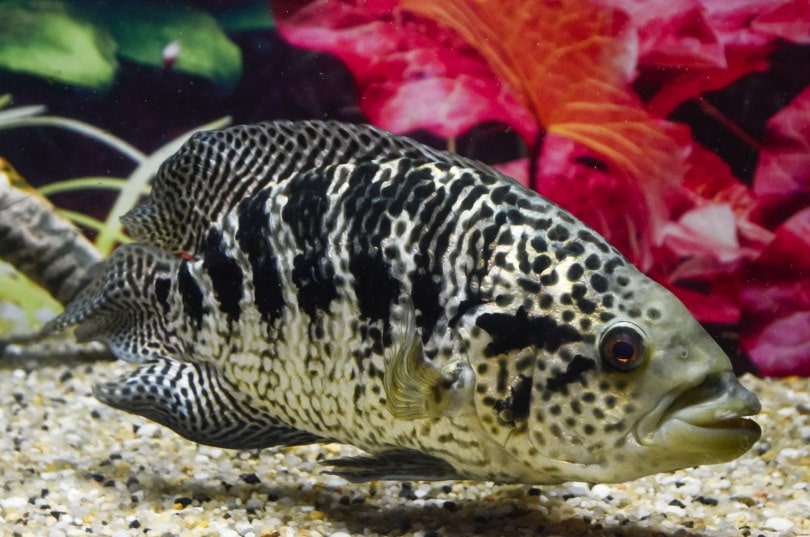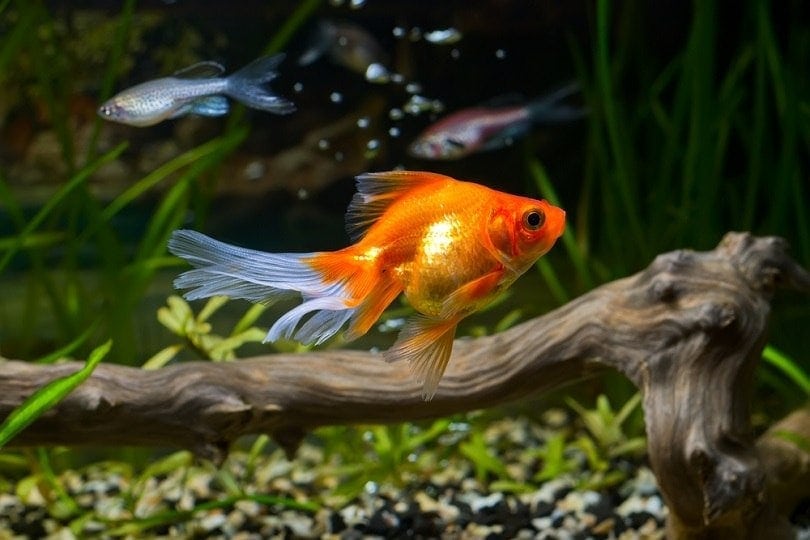6 Great Tank Mates for Lionfish: Compatibility Guide 2024

Updated on
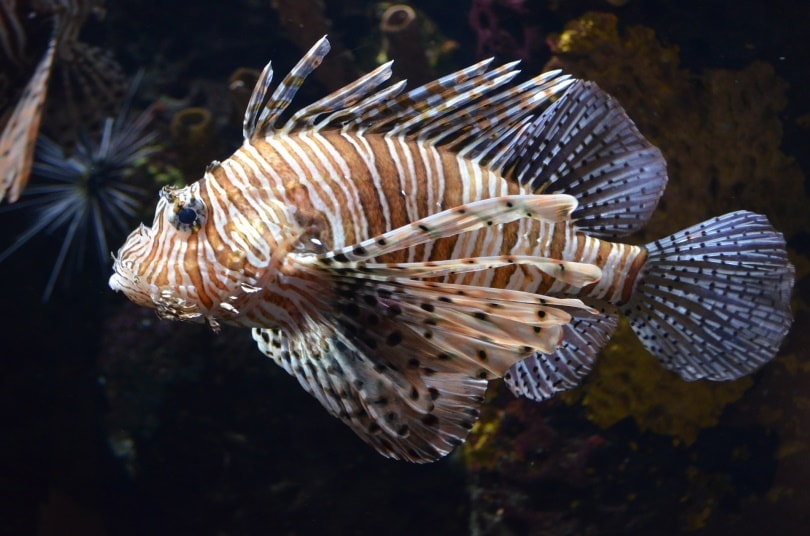
Of all the fish you can keep in a saltwater aquarium, few are quite unique, beautiful, and dangerous as the Lionfish! With its orange and white stripes and long pointed spikes, the spikes on a Lionfish are covered with venom that can produce a nasty sting. It’s somewhat intimidating on the surface, but Lionfish are quite peaceful and generally easy to keep in a home aquarium.
If you’re wondering what fish can live with Lionfish, we’ve got the answer for you! Below are the six best tank mates for Lionfish you can find at your local pet shop.
The 6 Great Tank Mates for Lionfish
1. Threadfin Butterflyfish (Chaetodon aurgia)
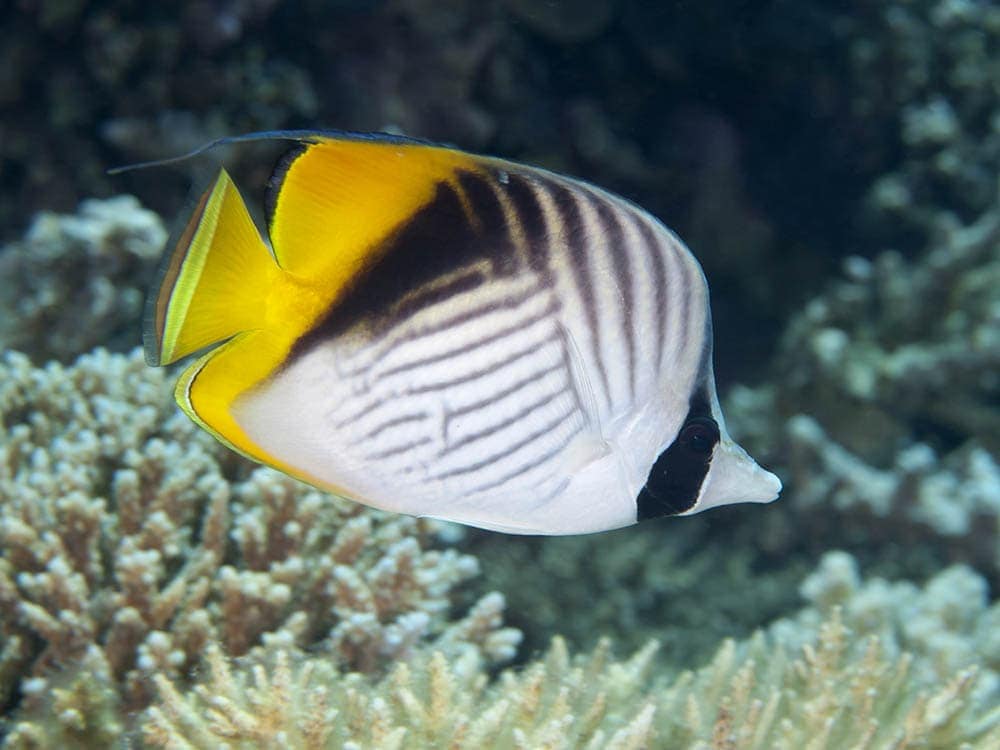
| Size | 8-9 inch (20-22 cm) |
| Diet | Herbivore |
| Minimum tank size | 75 gallon (283 liters) |
| Care Level | Easy |
| Temperament | Peaceful |
The Threadfin Butterflyfish will ignore most other fish and is generally peaceful, making it a good tank mate for a Lionfish. The Threadfin Butterflyfish is also a hardy fish and one that acclimates quickly when put in a new tank. These fish are inexpensive, easy to feed, and readily available at pet stores, making them one of the best saltwater species to pair up with a Lionfish.
2. Atlantic Rock Beauty (Holacanthus tricolor)
| Size | 8-10 inch (20-25 cm) |
| Diet | Omnivore |
| Minimum tank size | 100 gallon (379 liters) |
| Care Level | Medium |
| Temperament | Somewhat territorial and semi-aggressive |
The Atlantic Rock Beauty is mostly a specialist sponge-feeder that keeps to itself. Rock Beauties spend most of their time defending their territory, which means the tank needs to be large if kept with other fish. This fish needs rocks with plenty of crevices so they can hide from other fish. Because juvenile Rock Beauties are nippy, it’s best to only keep adult Rock Beauties in community tanks. This fish can live with Lionfish if the tank is roomy enough for the Rock Beauty to have its own territory.
3. Blue Hippo Tang (Paracanthurus hepatus)
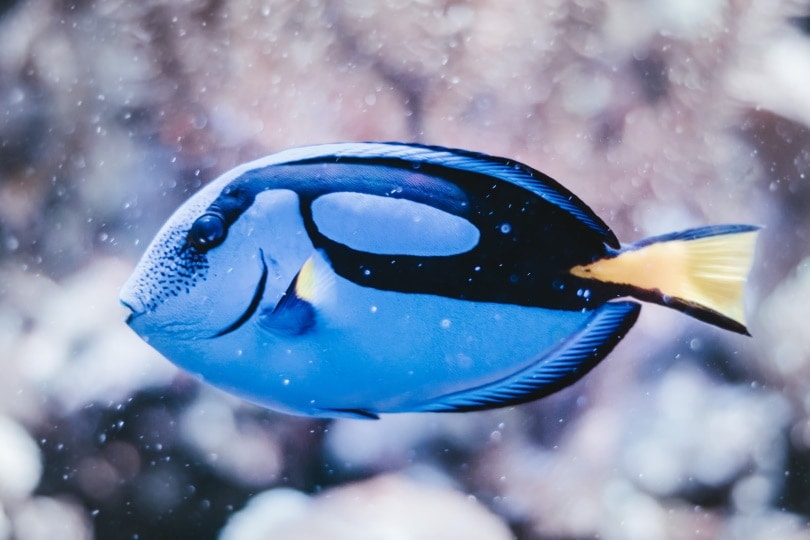
| Size | 9-10 inch (22-25 cm) |
| Diet | Herbivore |
| Minimum tank size | 125 gallon (473 liters) |
| Care Level | Medium |
| Temperament | Mostly peaceful but can be semi-aggressive and skittish |
Blue Hippo Tangs are active swimmers, continuously moving and nibbling over rocks and coral searching for their favorite food. As a fish that’s frightened easily, a tang will hide in rockwork when it feels threatened. As a mostly peaceful fish, a Blue Hippo Tang can make a good tank mate for a Lionfish as it will simply ignore the Lionfish and even hide from it if it comes into the Tang’s territory.
4. Harlequin Tuskfish (Choerodon fasciatus)
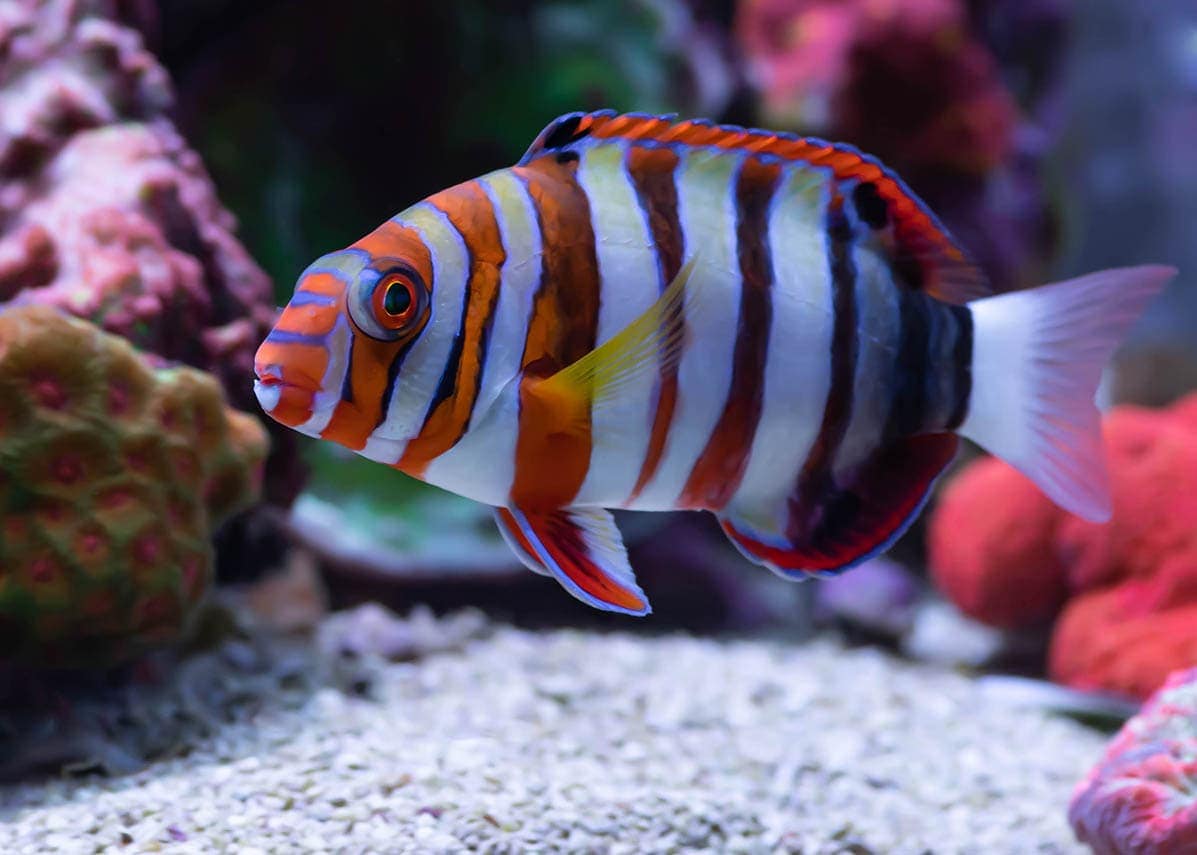
| Size | 10-12 inch (25-30 cm) |
| Diet | Carnivore |
| Minimum tank size | 125 gallon (473 liters) |
| Care Level | Moderately difficult |
| Temperament | Solitary, shy, semi-aggressive |
The beautiful Harlequin Tuskfish gets its name from its harlequin-like colors and large protruding teeth. While this fish can’t be kept with another Harlequin Tuskfish, it can live with angelfish, tangs, small triggerfish, and even a Lionfish.
As a shy and solitary fish, a Harlequin Tuskfish will mostly keep to itself. This carnivorous fish has a voracious appetite for invertebrates and crustaceans and will be somewhat aggressive if it feels its food source is being threatened by another fish. If fed well inside a large fish tank, a Harlequin Tuskfish can make a great tank mate for a Lionfish as both fish will simply leave one another alone.
5. Pantherfish (Cromileptes altivelis)
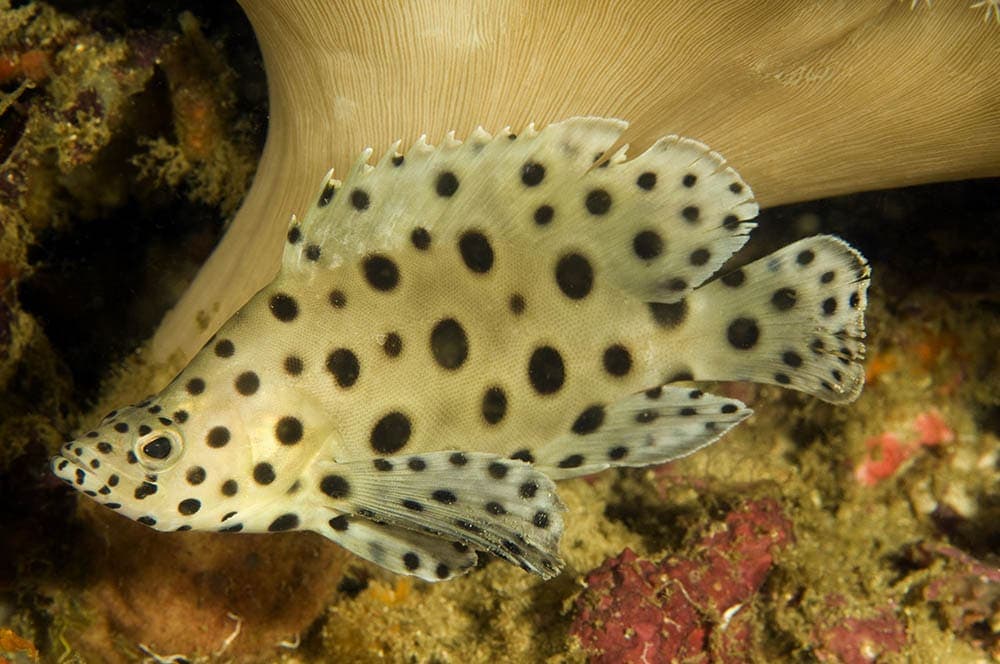
| Size | 27 inch (68.5 cm) |
| Diet | Carnivore |
| Minimum tank size | 300 gallon (1135 liters) |
| Care Level | Medium |
| Temperament | Predatory and aggressive |
With its black polka dot body and off-white skin, the Pantherfish is uniquely beautiful. Also known as the Humpback Grouper, a Pantherfish is quite predatory and can easily devour smaller fish that swim in its path.
This meat-eating fish has a large appetite and can grow quickly from a couple of inches to about 27 inches in just a few weeks if it gets plenty of food. However, if this fish is fed well, it will leave other fish alone. A Pantherfish makes a good tank mate for a Lionfish as it won’t see the Lionfish as prey and will simply ignore the spiked fish and stay out of its way.
6. Clown Triggerfish (Balistoides conspicillum)
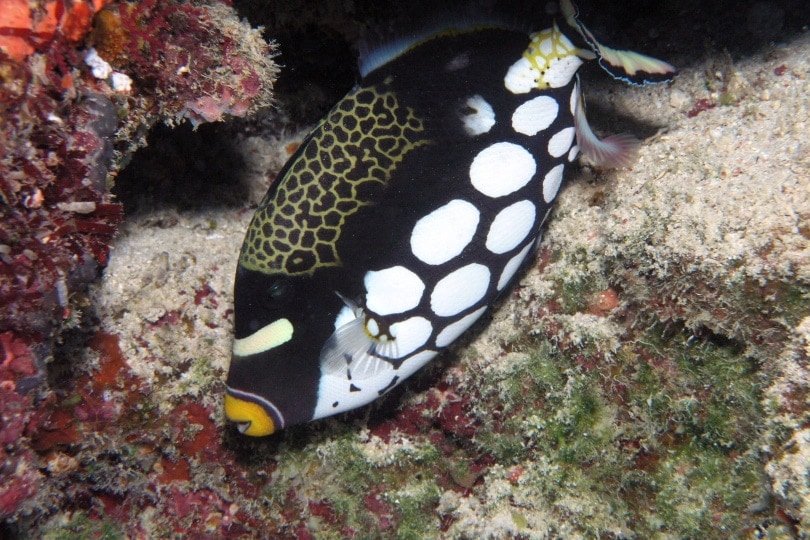
| Size | 20 inch (50.5 cm) |
| Diet | Carnivore |
| Minimum tank size | 120 gallon (454 liters) |
| Care Level | Easy to Medium |
| Temperament | Territorial, solitary, semi-aggressive |
The brightly colored Clown Triggerfish is a foraging predator with strong jaws and broad teeth. This is a popular fish to keep in a tank because it can become tame enough to be fed by hand, although it has very sharp teeth.
This is a territorial fish that gets more territorial the older and bigger it gets. It’s not afraid of much and will go after any smaller fish that come into its territory. A Clown Triggerfish makes a compatible tank mate for a Lionfish because it won’t see the Lionfish as a threat due to its size.
 What Makes a Good Tank Mate for Lionfish?
What Makes a Good Tank Mate for Lionfish?
A Lionfish will gobble up any small fish that fits into its large mouth which means this fish should not be kept with small fish of any kind. A good tank mate for a lionfish is a fish that matches the size of the Lionfish which is 13-16 inches in length and one that mostly keeps to itself and behaves predictably.
Where Do Lionfish Prefer to Live in the Aquarium?
A Lionfish will spend most of its time in a tank swimming close to rocks and other formations that provide it with places to hide. When a Lionfish is first introduced to a new tank, it will spend a few weeks to a few months hiding in rockwork and lounging about. Once the fish feels more comfortable in its new tank, it will venture further away from shelter and swim out in the open, although it won’t wander far from cover.
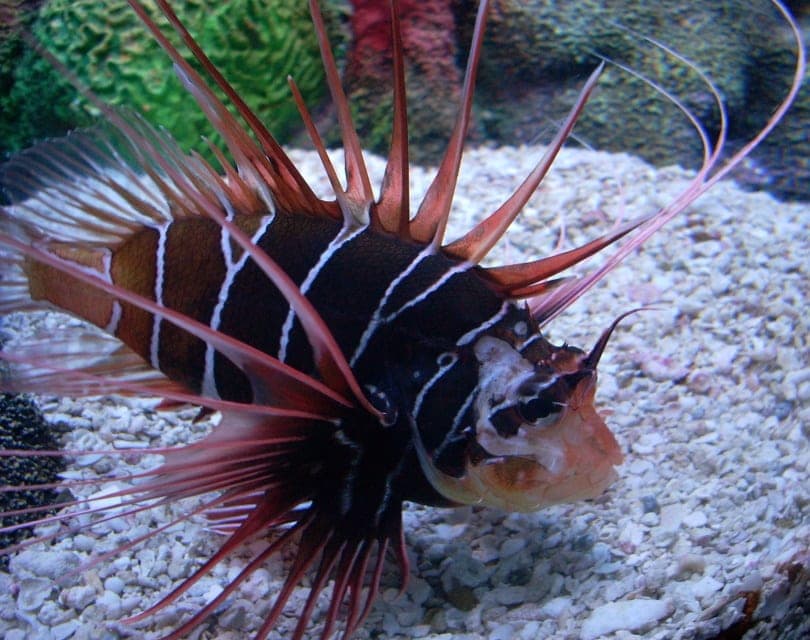
Water Parameters
Like other fish species, a Lionfish has certain tank requirements to ensure they can survive in home aquariums. As a saltwater fish, a Lionfish needs salinity in its tank. Ideally, a Lionfish needs a specific gravity (sg) between 1.021 and 1.023.
When you keep a Lionfish in a home aquarium, you have to clean the tank regularly by removing 20% to 30% of the water each week to get rid of food that has not been eaten, fish poop, debris, and dying plant matter.
Lionfish are commonly found in the warm tropical waters of the Indo-Pacific region and the Red Sea. These fish thrive in reef and rocky environments in the warm tropical and subtropical waters. When kept in captivity, a Lionfish should be kept in a tank with a water temperature between 72°F and 78°F. This fish prefers slightly alkaline water with a pH between 8.1 and 8.4.
Size
While juvenile Lionfish can be as small as one inch in length, a full-grown adult Lionfish can be as large as 18 inches in length. There are several varieties of Lionfish including dwarf varieties that typically don’t grow larger than 6 inches. The most common Lionfish are around 12 inches long.
Aggressive Behaviors
While Lionfish have aggressive tendencies, they don’t typically go after other fish as these are mostly solitary fish that like to be left alone. If a Lionfish feels another fish is a threat or if it’s frightened, it can charge at another fish with its poisonous spikes. However, Lionfish tend to leave other fish alone unless they’re being harassed.
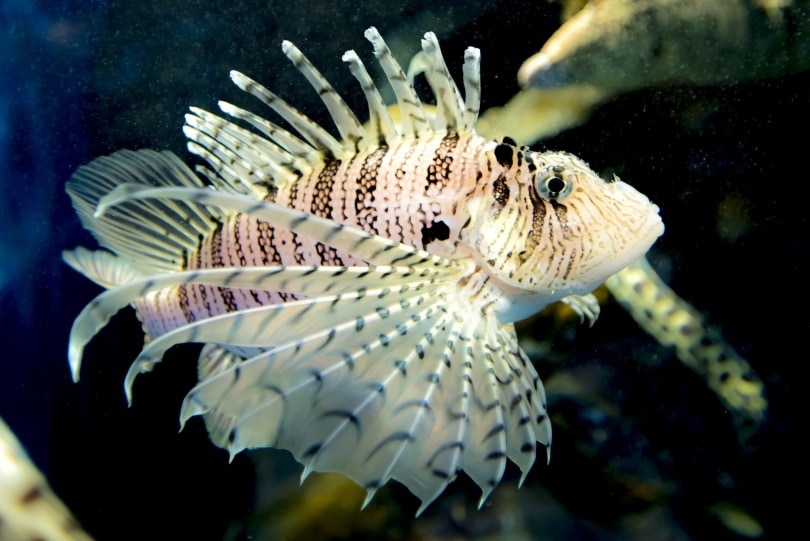
Top 3 Benefits of Having Tank Mates for Lionfish
While a Lionfish does best living alone in a tank, this fish can cohabitate peacefully with the fish listed above. There are a few benefits of giving your Lionfish some company including:
1. More Enjoyment for You
While a Lionfish is a beautiful fish to look at, it’s much more enjoyable to have a couple more fish to watch. It can be fascinating to see how a Lionfish interacts with other fish it shares its tank with.
2. Can Help Keep Your Tank Cleaner
When you have a tank mate for a Lionfish, you can enjoy keeping your tank cleaner longer, especially if you keep a plant-eating fish with your Lionfish. For example, if you were to keep a Threadfin Butterflyfish with a Lionfish, the Threadfin would feed on the decaying plant matter and other organic debris to help keep the tank clean.
3. A Tank Mate will Give a Lionfish some Company
Even though Lionfish are solitary fish by nature, giving one a tank mate will prevent the fish from becoming bored. In the wild, Lionfish live in a very diverse environment that’s full of other fish and sea creatures.
Conclusion
Lionfish are solitary creatures that generally don’t make good community fish. However, if paired up with the right species, a Lionfish can co-inhabit a tank with other fish. If you have a Lionfish and want to give it some company, be very careful about what fish you choose to add to your tank. Very few fish make good tank mates for Lionfish so pick one of the fish above to play it safe!
When you put a fish in with a Lionfish, keep a close eye on things to be sure the two fish are getting along. Be sure your tank is big enough to support more than one fish and don’t put any fish in with a Lionfish that fits into your Lionfish’s mouth!
Related Read:
- How to Lower Nitrates in a Saltwater Aquarium
- 10 Best Fish Tank Castle Decorations – Reviews & Top Picks
Featured Image Credit: netzwerker, Pixabay

 What Makes a Good Tank Mate for Lionfish?
What Makes a Good Tank Mate for Lionfish?